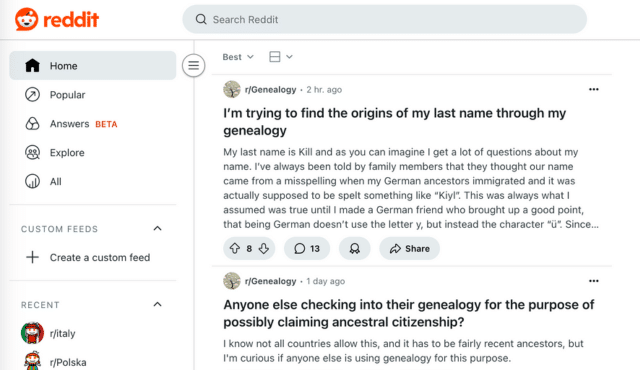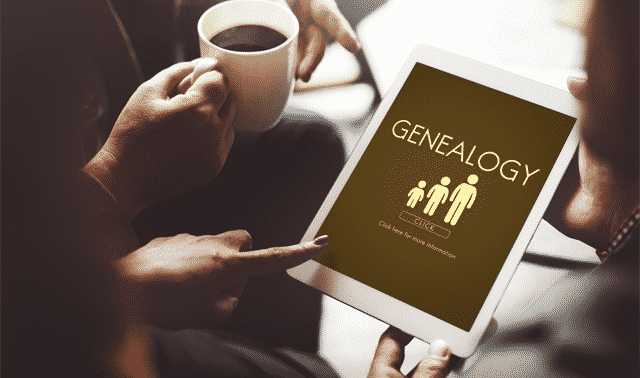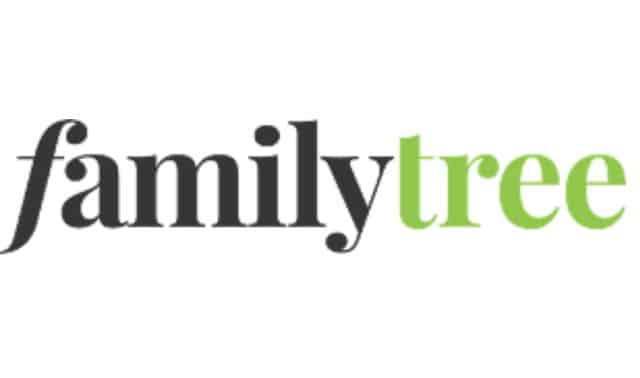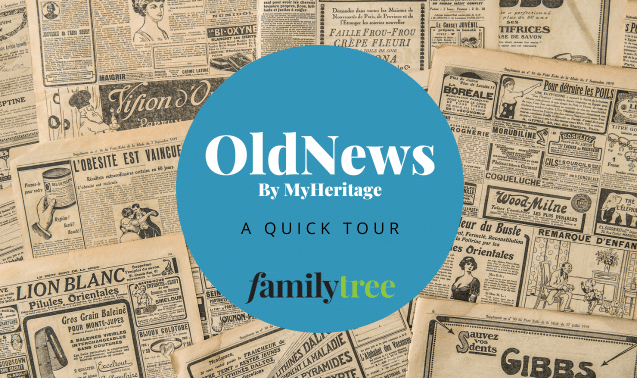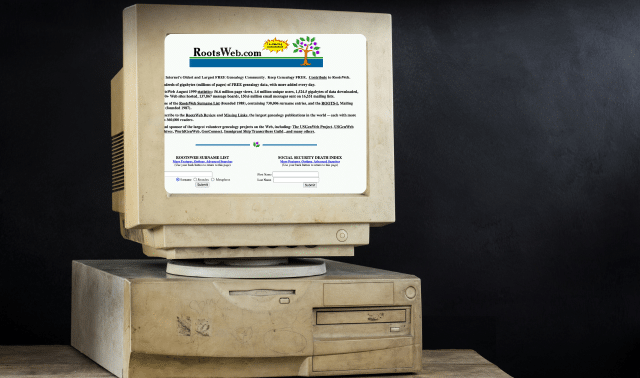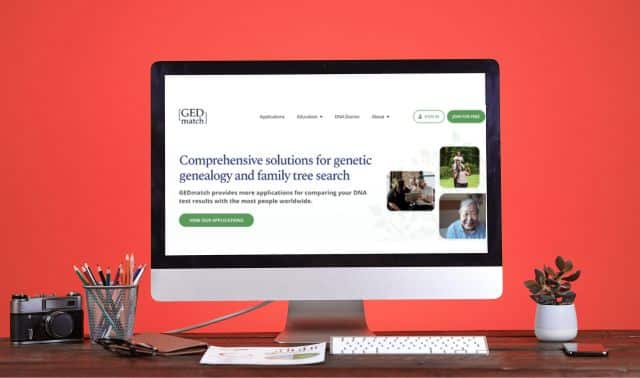Sign up for the Family Tree Newsletter! Plus, you’ll receive our 10 Essential Genealogy Research Forms PDF as a special thank you.
Get Your Free Genealogy Forms
"*" indicates required fields

When it comes to online genealogy research, it’s easy to become a creature of habit. You may find yourself—every time you start a new research session—making a beeline for your favorite websites, such as FamilySearch, Ancestry.com, MyHeritage or Findmypast.
But plenty of other websites that aren’t necessarily designed for genealogists can nonetheless prove useful. To help you break the habit of sticking with the same sites, we’ve come up with a list of 23 websites that can help you solve genealogy research problems, find valuable new resources and connect with cousins. Which ones should be next on your list?
1. ArchiveGrid
Full tutorial here.
This website boasts a collection of more than 2 million archival items in collections held by thousands of libraries, museums, historical societies and archives.

Search detailed finding aids that identify specific, original historical documents: birth and death records; ship passenger manifests; cemetery records; personal papers, letters and diaries; records of schools, businesses and churches; family histories and other archival materials. ArchiveGrid also provides contact information for the institutions where the collections are kept.
2. David Rumsey Map Collection
Full tutorial here.
Maps help us trace our ancestors’ footsteps. The 64,000-plus maps and other cartographic images on this site focus on rare 18th- and 19th-century North American and South American materials.

Historic maps of the world, Europe, Asia and Africa are also represented, as well as atlases. View maps, compare them side-by-side and download high-resolution files. A georeferencing tool even allows you to overlay historic maps on modern maps or other historic maps, useful for viewing an ancestor’s neighborhood and how it has changed over time.
3. Digital Public Library
This ever-expanding website draws on the resources of some of the nation’s leading repositories. Explore more than 11 million digitized items from libraries, archives and museums across the country in this online repository.

Search the whole collection with a single click, or narrow your search to a place or time period for photographs, books, audio and video files, maps (including the full David Rumsey Historical Map Collection) and more. Catalog listings link to digitized items on the holding library website. For fun and historical context, browse exhibits on topics such as the Civilian Conservation Corps, Civil War maps and the Gold Rush.
4. eBay
Full tutorial here.
You wouldn’t think this online auction site would be the place to go for genealogy, but the truth is you can find family trees, books, photo albums, old postcards, family Bibles and much more. Some genealogists even scour eBay to rescue orphan heirlooms they can return to family members.

Typically, items are listed in the Everything Else > Genealogy category. But check other categories such as books, collectibles, antiques and jewelry. In your eBay profile, you can follow Favorite Searches (this feature used to be called Saved Searches) and get email alerts and updates in your eBay feed. Also create searches like Smithson family Bible or Riser geneology (sometimes sellers misspell “genealogy”).
5. EasyBib
Proper source citations are a must for genealogists. Evidence Explained: Citing History Sources from Artifacts to Cyberspace by Elizabeth Shown Mills is the source citation bible for genealogy, but there are times when you may wish to streamline the process a bit first. EasyBib is a free tool that helps you generate source citations in MLA, APA, Chicago and other formats.

Choose the type of source (such as website, book or newspaper) and enter the URL or title. EasyBib shows you basic information—for a book, the full title, author and publication details. You can edit it and add a page number and other specifics, then click to create a formatted citation. The ad-free Pro version offers unlimited cloud backup for your citations and 7,000 additional citation templates.
6. Facebook
Where else can you keep in touch with your grandma, your niece and your “geneapeeps” all in one place? As the most popular social network worldwide, Facebook has more than 1.5 billion monthly active users. Not only can you use Facebook to connect with cousins, but it is a great forum for asking genealogy-related questions, finding other researchers working on the same surname or ancestral lines, or requesting help with foreign record translations. Search for pages or groups for your ancestors’ hometowns and even their ancestral villages.

You also can download the Genealogy on Facebook list, a 173-page PDF file containing 5,700-plus links, published by Katherine R. Willson. A Canadian version by Gail Dever includes French-speaking groups and pages.
7. Flickr
Yahoo.com offers 1TB of free photo storage via its Flickr photo-sharing site. Options include the ability to maintain public or private online albums, edit and share photos with others. Uploaded photo files are saved at full resolution and can be downloaded again with no loss of quality. Viewable and sharable images on the site are compressed to a smaller size and therefore lower quality.

One caveat: If you’re going to include others’ Flickr images on your blog, check the permissions/creative commons license to make sure it is available for use. See Family Tree Magazine readers’ ancestral photos and share your own.
8. Google
By now, most genealogists are used to running Google searches on surnames, ancestral locations and other topics of interest. But Google is so much more than a search engine, and so many of its other free products can be used for furthering family history research.

Think of Google as a one-stop shop for genealogy tasks:
- Google Photos’ facial recognition software provides the ability to make quick videos, and unlimited storage make it a great tool for any genealogist.
- Tap into the power of Google Maps or Google Earth, where amazing detailed satellite views and street maps can help you zoom in on even the tiniest towns or villages.
- Google Books content is just staggering: It is the “world’s most comprehensive index of full-text books.”
- Need a quick translation? Google Translator can help.
- Create a family history blog in minutes with Blogger.
- Watch and post videos to YouTube.
- Save and share files for free with Google Drive.
9. HathiTrust
HathiTrust is an online library of millions of titles digitized from academic and research institutions around the world. From the home page, you can search the catalog for descriptive terms about an item (like a title or author) or run a full-text search that includes words within the digitized book or other item (like a name, place, citation or favorite quote).

Advanced search options are available, too. Use quotes to search an exact phrase (such as “The Great Depression”) or use wildcards (* or ?) to search for alternate forms of a word (wom?n will find woman and women).
10. History.com
Historical events influenced where your ancestors lived and worked, where they worshipped and how they made life-altering decisions. Learning history helps you put their experiences in historical context and flesh out a timeline when writing their stories.

On this website, you can explore what happened on a certain day in an ancestor’s life, listen to famous speeches and other audio that reflects the news of your ancestors’ times, and read lists of little-known facts about historically significant events such as the attack on Pearl Harbor and the Lewis and Clark Expedition. (You can even get answers to those questions you always wanted to ask, such as “Was Dracula a real person?” or “Did Shakespeare really write his own plays?”)
11. Historypin
This UK-based site boasts more than 400,000 member submissions of old photos, each plotted on Google Maps.

Use this site to compare images of the past against a modern street view and better understand your ancestral neighborhoods, identify old family homes or businesses, and see what historical properties remain today that may be worth visiting. You can contribute your own photos to this collaborative effort, too, with a free registration.
12. Instagram
Instagram is an online photo- and video-sharing site that lets users take pictures and videos, style them with digital filters and share via Facebook (which owns Instagram), X, Tumblr and Flickr. Photos are presented in a square format, similar to Kodak Instamatic and Polaroid images. Instagram photos are perfect for blog posts and visual storytelling (think Grandma’s wedding, honoring a veteran, etc.) or for building an online brand for your genealogical or historical society.

The National Archives is on Instagram, and so are Ancestry.com and a host of other genealogists and genealogy companies. Use #genealogy to search or tag family history images, then post across social networks such as Facebook and X. Instagram also lets you record and share short videos (up to 15 seconds).
13. Internet Archive
Full tutorial here.
The nonprofit digital library known as Internet Archive, launched in 1996 by Brewster Kahle, offers free public access to millions of public domain books, along with music, film, photographs and other archived historical records. The site’s ever-expanding collection of genealogy resources includes items from the Allen County Public Library and the Brigham Young University Library, among others. Search by collection, title or series, or use Google to run a search like Henry Hoffner Clinton Iowa site:archive.org, which will look for results only in the Internet Archive. One of my favorite Internet Archive finds is Praktiný slovensko-anglický tluma (The Practical Slovak American Interpreter).

Internet Archive also archives entire websites (over 452 billion pages) through its Wayback Machine, which allows you to search the web as it was from late 1996 to today—handy for when you find out one of your favorite web pages is no longer available.
14. JSTOR
JSTOR (or Journal Storage) is an online collection of more than 7 million articles in 2,000-plus academic journals, including many covering history or published in the United States before 1923 and in other countries before 1870. You can search JSTOR for free and check with libraries for copies of journals or try the free Register & Read plan, which lets you read up to three articles every two weeks.

Frequent users should consider the JPASS, which provides access to about 1,500 of the journals. Both plans allow unlimited access to read articles without downloading. JPASS makes it easier to use JSTOR, especially if your library doesn’t offer the service. (See the May/June 2014 Family Tree Magazine for a JSTOR tutorial.)
15. Library of Congress
Full tutorial here.
This site helps you access many of the riches of the nation’s library. From here, you can search the main library catalog and the National Union Catalog of Manuscript Collections (NUCMC). The American Memory collection digitizes everything from maps to old advertising circulars, even audio and video recordings.

The Chronicling America newspaper collection now tops 10 million pages from the country’s past, spanning 1836 to 1922. There’s an introduction to the library’s Genealogy and Local History Research Center, where you’ll learn helpful tips and search among more than 50,000 compiled family histories and 100,000 local histories. You can’t borrow most of these titles from the Library of Congress, but at least you can learn about them and then use WorldCat to find copies at your library or through interlibrary loan.
16. Pinterest
Pinterest is a virtual bulletin board where you can “pin” articles and images you find online or that you upload from your computer. Use it as a place to curate content about an ancestor, collect family recipes or keep a list of your favorite resources on a specific topic (for example World War II history, or female ancestors). Use Pinterest to create family timelines and memorials by pinning captioned images important to a person’s life.

You can then use your pinned information as a storyboard for writing a profile or family history. Look for new tips and tricks on boards such as Abundant Genealogy’s Genealogy Tip Jar. Before you pin, read the terms of service so you can respect others’ copyright when “repinning” and know what you’re agreeing to when you pin your own images.
17. Reddit
Reddit, the so-called “front page of the internet,” is a not-so-well-hidden gem for genealogists. The site has a reputation for connecting dedicated enthusiasts and encouraging authentic conversations—not unlike the forums and message boards of old. Reddit has become so well-respected that Google increasingly links to Reddit posts in search results—perhaps a Google search is where you first encountered the site.
Reddit hosts thousands of forums (called “subreddits”) about specific topics or interests. Here, users can share text, images, memes, videos or GIFs with others. Subreddits popular among genealogy enthusiasts include r/Genealogy, r/AncestryDNA, and r/TheWayWeWere. Learn more about how to utilize Reddit for your genealogy and family history research in this guide for genealogists.
Contributed by Andrew Koch
18. Trello
Full tutorial here.
Ever wished for a whiteboard in the cloud? Say “hello” to Trello. Trello is a free, web-based tool for organizing your projects. If you like to use index cards to organize, Trello may appeal to you. Sign up for a free Trello account or sign up using your existing Gmail account (but read the terms of service, because you’ll be asked to allow Trello to view your email address, basic Google profile info and more). It’s easy to use and flexible: You choose how much detail to enter, and set up boards with collections of customizable lists. The lists contain cards.

A good genealogy setup might be a board for each surname you’re researching, another for a family history book project, and one for each genealogy conference or online class you attend. You can put your cards into lists to track progress or categorize tasks. You also can add members if you’re working on group projects and get notifications of changes made to the lists. Trello works with Chrome, Safari, Firefox and Internet Explorer web browsers, and has an app for most devices.
19. X
This social media giant had more than 320 million users!
Despite the 140-character limit for each message or post users can send, genealogists can use X to locate new resources for research; follow genealogy companies, websites and blogs; get advice on software and technology; learn to write source citations and publicize conferences and events.
20. WolframAlpha
Need to know the weather for a specific date? What about calculating a birth date based on a death date from a gravestone? WolframAlpha is a computational knowledge base that accesses more than 10,000 databases to return information based on your calculation requests.

Find tips in Guide to WolframAlpha for Genealogy and Family History by Thomas MacEntee (self-published). For example, type in grandmother’s aunt and a family tree will appear along with other data, including a blood fraction percentage.
21. WorldCat
Full tutorial here.
WorldCat connects you with the collections of 10,000 libraries around the world, including the Family History Library (FHL). You can search catalog information about more than 2 billion books, newspapers, images, sound files, microfilmed and downloadable materials and more.

Once you’ve found promising titles, WorldCat will help you locate them in libraries you can visit or borrow from via interlibrary loan for a small fee. You could use WorldCat to locate microfilm of an old newspaper or a circulating copy of a book listed in the Library of Congress or FHL catalog. A variety of widgets and apps makes it even easier to search the world’s libraries from this central location.
22. YouTube
Learn about your ancestors’ world, get fascinating insight into their lives and explore ancestral locations all from the comfort of your couch via YouTube.
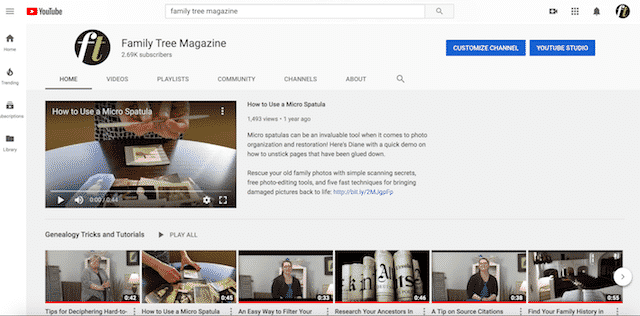
I was thrilled when I discovered several YouTube videos that made up a walking tour of my grandfather’s birthplace, Osturna, Slovakia. You can also watch instructional videos on just about any genealogy subject posted by individual researchers and companies such as Ancestry.com.
23. Zillow
Most users visit this online real estate site to browse for-sale and rental listings, but genealogists can use the site or its app to search for the address of an ancestor’s residence.

View current value and other information, and use the map feature to get a closer look at what the house looks like now and to view the neighborhood.
Related Reads
A version of this article appeared in the March/April 2016 issue of Family Tree Magazine. Last updated: July 2025

